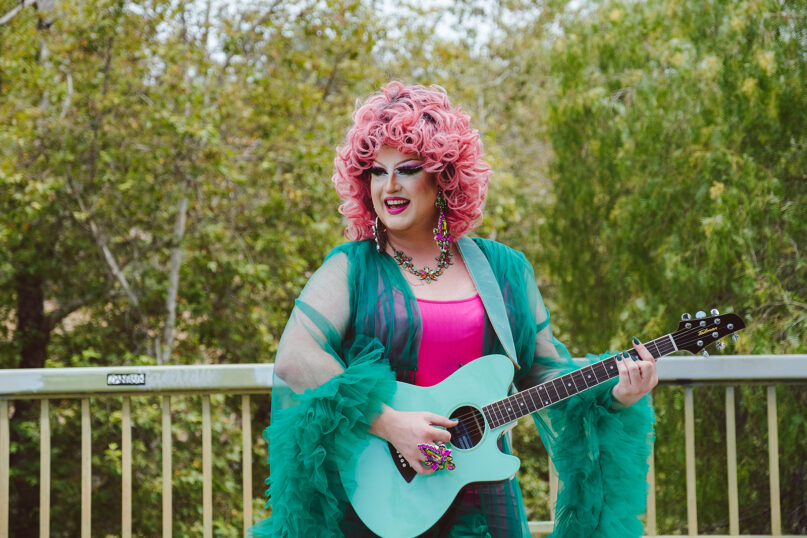(RNS) — Matthew Blake Lovegood was a 9-year-old kid living in a conservative Appalachian town the first time they wrote a song about Jesus.
Sitting in their basement bedroom in 1991, Lovegood didn’t yet know how to play an instrument, so they composed the melody in their head before serenading their mother with the original two-verse tune.
Lovegood hasn’t stopped songwriting since.
Decades later, Lovegood, better known as Flamy Grant, has been dominating headlines as the first drag queen to top iTunes’ Christian music charts. It’s a surreal time for Lovegood, 41, who grew up aspiring to be a contemporary Christian music (CCM) artist. They were already planning a move to the East Coast to pursue a full-time drag career when their now-famous clapback at Christian musician and Turning Point USA contributor Sean Feucht, who condemned a collaboration between Flamy Grant and musician Derek Webb, catapulted Flamy Grant to fame.
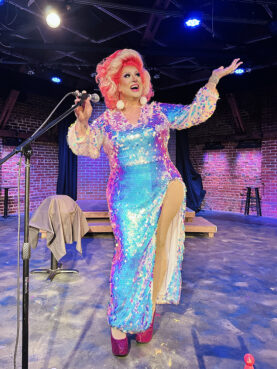
Drag queen Flamy Grant on stage. Photo courtesy of Grant
But the ballads of Flamy Grant aren’t likely to grace your local K-LOVE station any time soon —the Christian music world isn’t exactly queer friendly, and Christian airwaves are currently flooded by worship artists, not singer-songwriters. Still, that hasn’t stopped Flamy Grant, who is planning a tour throughout the fall and winter and has already made plans to attend October’s Dove Awards, the Christian music equivalent of the Grammys.
“I want to be part of the movement showing the next generation of queer kids coming up in that (church) culture, that there is a hopeful, bright and wonderful future for you,” Lovegood told Religion News Service. “You are fearfully and wonderfully made.”
Lovegood’s religious roots were planted in rural North Carolina, where they were raised on the holy trifecta of home, church and Christian school. Their family belonged to the Plymouth Brethren, a Christian movement that doesn’t have clergy, but, according to Lovegood, does have a good dose of patriarchy.
“There’s no leadership, no paid staff for our church at all. It’s just, literally, if you have a penis, you get to lead the congregation,” Lovegood said. They described services as an hourlong lesson in shame — a topic Lovegood quickly grew well acquainted with when they began to realize they were queer around third or fourth grade.
“I caught on pretty quickly that my queerness was going to be a thing that disqualified me from the kingdom of heaven,” said Lovegood. “And so I worked extra hard to make up for it right and be the best Christian I could, live into all the expectations that were set out before me.”
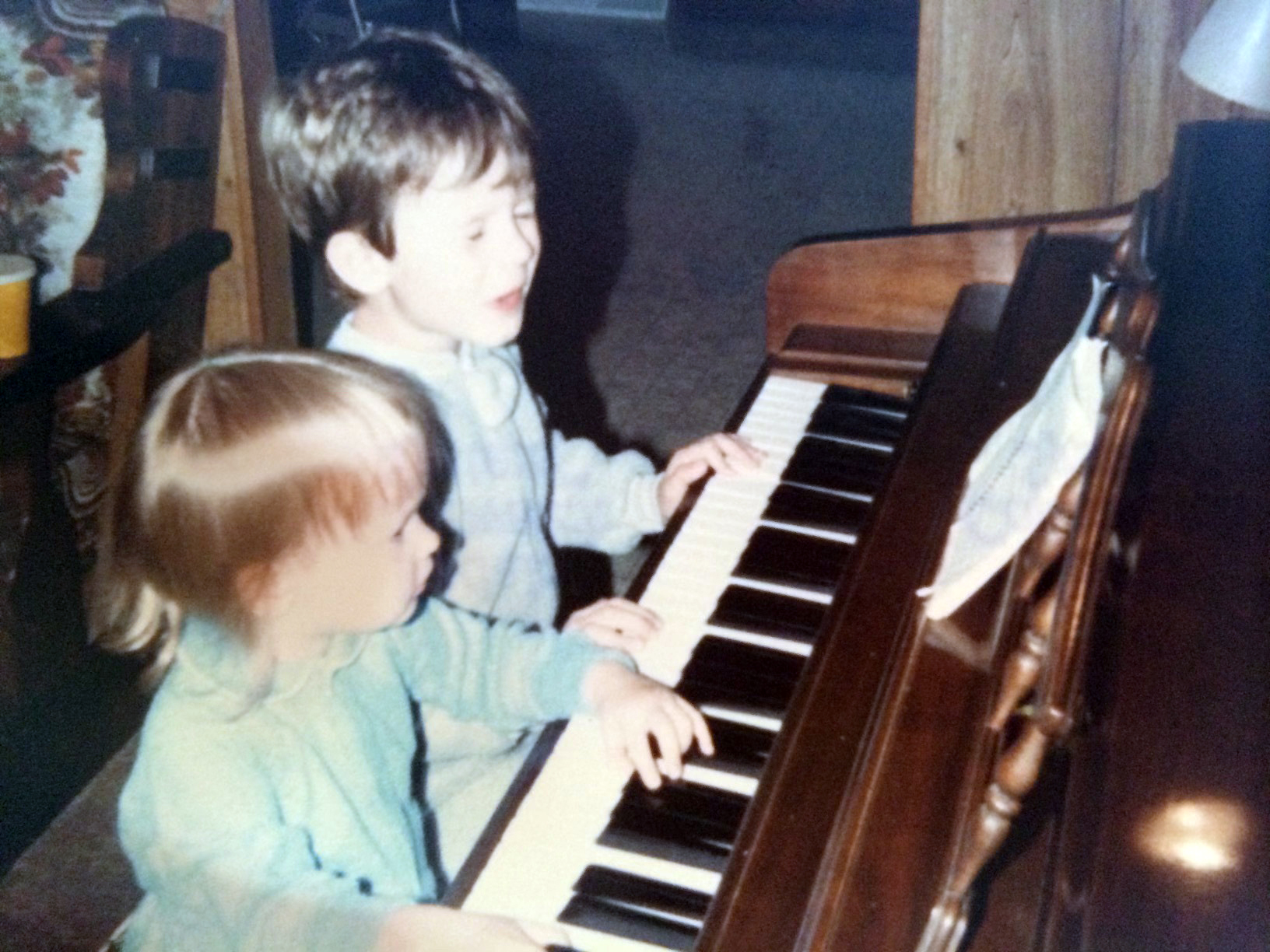
Matthew Lovegood, top, plays the piano as a child. Photo courtesy of Lovegood
Around the same time, Lovegood got ahold of a collection of Amy Grant cassette tapes. Lovegood recalls that when their family finally got a home stereo, Lovegood would sit in front of it, listening to songs by the Christian musician-turned-pop-icon on repeat. Lovegood began to dream of a career singing about Jesus.
By the time Lovegood was in college in the early 2000s, they had learned guitar and co-founded a Christian band called Eco Chamber. The name was not meant to be ironic, said Lovegood, despite the insular Christian world they were surrounded by. The first person Lovegood came out to was a bandmate.
“I couldn’t say the words ‘I’m gay,’ so I got out the Bible and pointed to Romans 1, handed it to him and said, ‘This, this is the thing I struggle with.’”
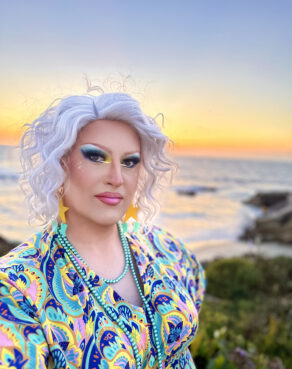
The sun sets behind drag queen Flamy Grant. Photo courtesy of Grant
Lovegood remembered shoving the Bible in the bandmate’s arms, then collapsing into the fetal position, crying convulsively. That moment set off a decade-long process of coming out. At first, Lovegood would talk to friends about “struggling with homosexuality.” Searching for a formula to become straight, Lovegood stumbled into Exodus International, attending group therapy sessions and consuming the literature of the now-defunct flagship organization of the ex-gay movement, which promoted conversion therapy.
By 2006, Lovegood was a worship leader and church planter living in San Diego still waiting for their queerness to evaporate. But it never did. Desperate for answers, Lovegood turned to research, examining every possible interpretation of the “clobber passages” — the handful of Bible verses used to argue that queerness is incompatible with Christianity.
“Finally, in 2010 I was like, I am gay and that’s not going to change. I know that because I’ve put every possible, sincerest effort into making that happen. I still feel like I have a relationship with God … and I don’t think the Bible is telling us that we can’t be gay.” After Lovegood shared this realization with their then-pastor, best friend and fellow church planter, the pastor drew a hard line: Lovegood couldn’t serve as a church leader if they were dating men.
After years of suppressing who they were, Lovegood decided that was a boundary they couldn’t stick to. Four years later, Lovegood was dating their future husband, Chris Lovegood, and was leading worship at a different San Diego church that didn’t require members to agree to a creed. At the same time, Matthew Lovegood began to openly reject the label of Christianity and in 2017 started a podcast called “Heathen” that discussed deconstruction before it was trendy.
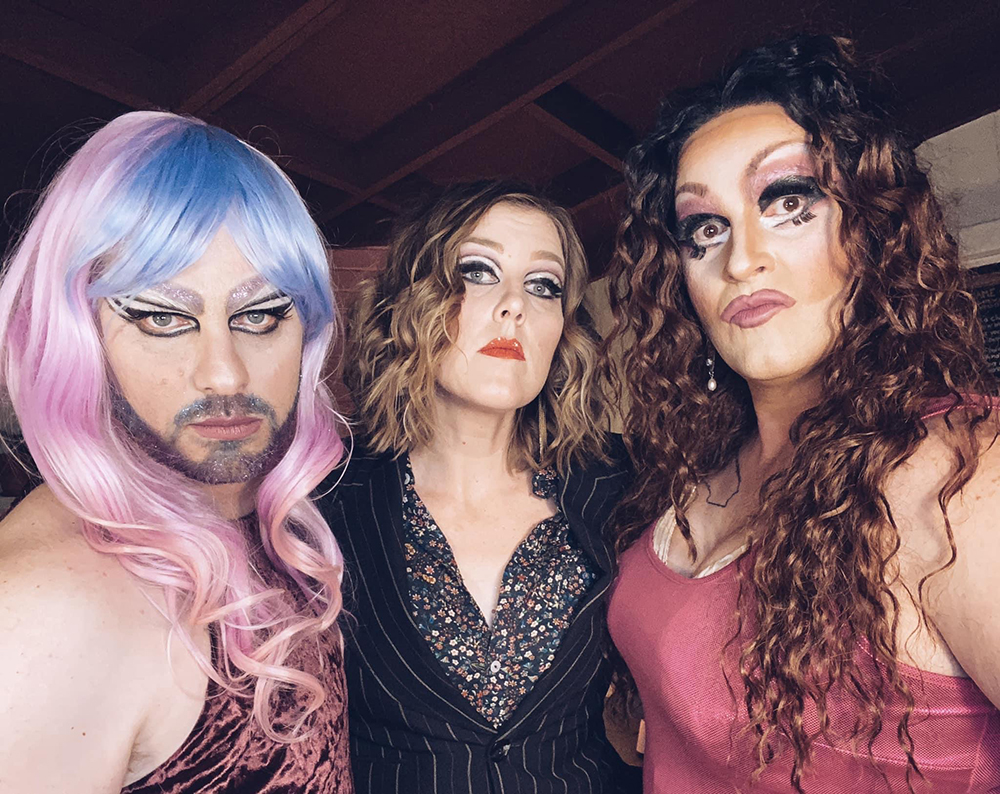
Heathen podcast co-hosts Ben Grace (as Sandi Patty), from left, Karyn Thurston (as Nichole Not a Man) and Flamy Grant during a Heathen Happy Hour Drag concert. Photo courtesy of Thurston
During the pandemic, Matthew Lovegood joined their housemates and podcast co-hosts in a weekly livestream cover concert for “Heathen” listeners. Some videos attracted more than 2,000 views, including Lovegood’s first drag performance in a cover concert featuring Disney songs and music by the Chicks. Donning a hot pink dress, matching lipstick and a long, dark curly wig, Flamy Grant emerged, her looks evolving week over week.
“There were a lot of shoes,” Karyn Thurston, one of the co-hosts and housemates, told RNS, laughing. “We got a fifth roommate, this one with the most clothes.”
For Lovegood, becoming Flamy Grant was both a form of creative expression and inner-child work. “It was me connecting with that kid version of myself who wanted to play with my mom’s makeup and got in trouble for it,” they said.
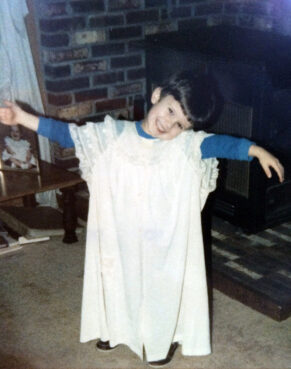
Matthew Lovegood as a child. Photo courtesy Lovegood
Months into refining her look and her persona, Flamy Grant was invited to deliver a sermon at the San Diego church where Lovegood was still leading worship. Flamy Grant made a TikTok video, practicing a brief homily on self-acceptance in preparation for the sermon she’d deliver later that week. The video went viral and was the first time Lovegood realized drag could be more than a hobby.
“Flamy is talking about love, acceptance, you are whole, you are welcome, you deserve to be here,” said Chris Lovegood, Matthew’s spouse. “I think a lot of people that have been burned by the Christian faith … are seeing themselves in Flamy and saying, oh, I can have faith and still be open and welcoming.”
Though Matthew Lovegood no longer attends church — “I gave myself so fully and so intently to church the first 40 years of my life, I want to do something different the next half,” they said — they still see Flamy Grant’s music as part of the Christian genre. “Bible Belt Baby,” which she released in 2022, has songs about the women of the Bible, growing up in church and, of course, an Amy Grant cover.
“You sent me away, but I was never alone. You were afraid that there was not enough, but you can’t run out of love,” Flamy Grant sings in “Good Day,” the gospel-inspired final song on the album.
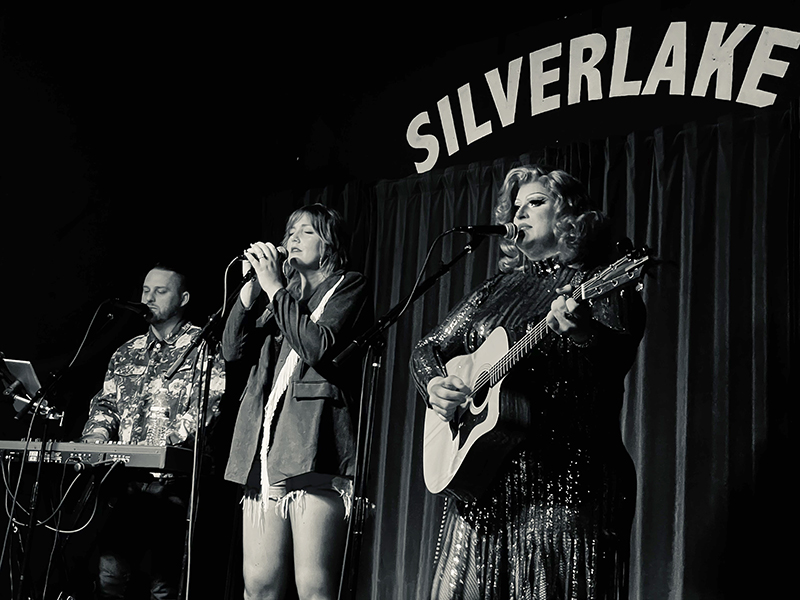
Ben Grace, from left, Karyn Thurston and Flamy Grant perform together during a recent tour. Photo courtesy of Thurston
Thurston, part of the music duo Story & Tune along with her husband, Ben Grace, toured with Flamy Grant a few months back. Thurston said it was “magical” to witness the unusual combination of drag and church trauma unlock something in audiences, giving people permission to dance, dress up, yell and fully express themselves. Grace said that after a life of working in church work, Flamy Grant’s concerts finally felt like home.
But while music by Flamy Grant and other queer and queer-affirming artists like Semler and Derek Webb deals directly with themes of faith and spirituality, for them, topping CCM charts doesn’t happen the usual way, with agents and record deals. It requires a groundswell of support via social media. According to Semler, whose song “Faith” and album “Preacher’s Kid” have both topped Christian iTunes charts, those who run the Christian music industry aren’t representative of the full breadth of Christianity, which includes believers who are queer or doubting.
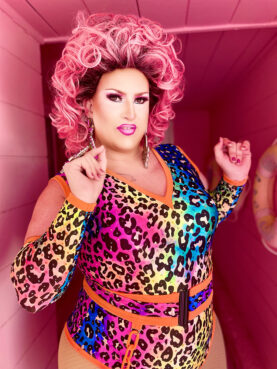
Drag queen Flamy Grant. Photo courtesy of Grant
“I think thematically is where we’re carving new territory. And I think that’s what’s really exciting, is just expressing a new possibility of a relationship with God and divinity,” Semler told RNS. “That is what’s new, but that’s also not new within Christian spaces. It’s just new within I think Christian media, which is embracing layers of doubt, questions of joy, inclusion.”
When asked why they’ve opted to release Flamy Grant’s music in the Christian genre despite the difficulty, Lovegood said it’s about visibility, especially for queer kids growing up in the church: “I want to push back, and be more of a prophetic voice, in the biblical sense — a member of the community who is speaking out about the ills and the wrongs of the community, and asking us to consider, and change, and love bigger, love harder, love more.”
This story has been updated.
